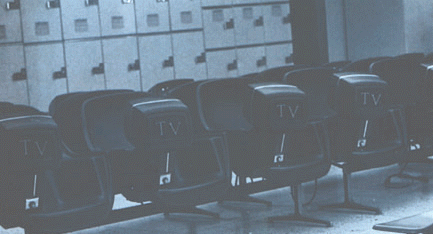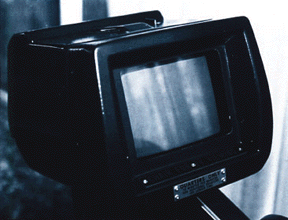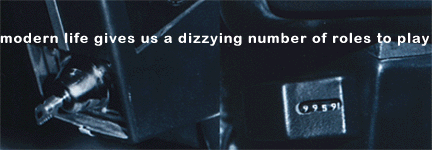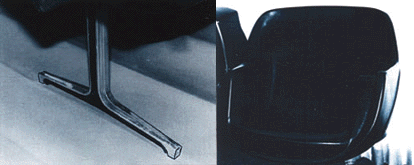In her most recent book, Life on the Screen: Identity in the Age of the Internet, Sherry Turkle explores the intersections of computer culture, psychoanalysis and art. Turkle is a professor of the sociology of science at the Massachussetts Institute of Technology, a licensed clinical psychologist and holds a joint Ph.D. in Personality Psychology and Sociology from Harvard University. She is the author of several books, including The Second Self: Computers and the Human Spirit, and Psychoanalytic Politics: Freud's French Revolution. Turkle's work has been supported by the National Science Foundation and the MacArthur Foundation; she has received fellowships from the Guggenheim and Rockefeller Foundations.
Sherry Turkle delivered the keynote speech at ISEA97, The Eighth International Symposium on Electronic Arts that took place in Chicago (September 22-28). Beginning her talk with the quote from Walt Whitman that also stands at the beginning of her book "Life On the Screen,"
"There was a child went forth every day,
And the first object he look'd upon, that object he became."
--Walt Whitman)
she focused on the phenomenon that the objects and artifacts of our own creation in turn define us. In her speech, she addressed the question of how our lives are affected when "the first objects we look upon" are representations of ourselves and others. Turkle made a basic distinction between "objects you think with" and "objects you design with" and recounted the experiences of people who use computational objects for designing.
|

|
She described a conversation with an architect who told her that he felt he could generate drawings more effectively on a computer but experienced a loss of attachment to the work. What he lost was his sense of relationship to the mark: there was a significant lack of personality in the mark he produced on a computer screen as opposed to a piece of paper. Another educator commented that computers--as design tools for students of architecture or physics--seem to bring the real
closer since they allow iterative drawings, data crunching etc. The question remains if the constant exposure to simulation and the lack of experience of a physical object ultimately results in a level detachment akin to "Physics, the Movie" and/or "Architecture, the movie."
Turkle's keynote speech mostly focused on computers as objects to think with and represent ourselves--on the issue of identity in the age of the Internet. Turkle addressed the question of how online life affects what she calls ROL (the Rest Of Life)--a term she prefers to the commonly used RL (Real Life), which implies that virtual life doesn't have its own reality. In the age of the Internet, people visit MUDs and MOOs and choose avatars to represent themselves in virtual environments; they slip in and out of character. In a virtual community, the "players" live parallel lives by cycling through windows. The metaphors that influence our experience of life are what Turkle is most interested in, and "windows" have become one of the most prominent of these metaphors. Virtual life allows people to have a presence in several windows and contexts simultaneously.
Turkle defines the online self as a multiple, distributed, time-sharing system. Our identity in the age of the Internet is characterized by multiplicity, heterogeneity and fragmentation, which result in the need for a practical philosophy of self-knowledge. The following interview with Turkle picks up on the themes discussed in her keynote.
|

|
ia: You indicate that our use of computers as tools to design with might result in the loss of our sense of relationship to the mark. What do you think will happen to individual "style"? Will personal style become conceptual style? Will style enter into it at all? Or will it be lost forever?
|
st: In the age of the Internet, people are able to construct themselves. Virtual communities can be seen as a new genre of artistic endeavor, a new form of performance art or improvisational theater. What distinguishes the virtual are the new genres developed through computer-aided design.
Computer-aided design tools leave room for style to reemerge, although in a different form than before. I think we are going to become sensitive to new ways of thinking about style--and develop new abilities to recognize new genres developed through computer aided design.
|
|
ia: Your studies of online communities sometimes seem to imply that there is a lack of critical reflection on the issue of online identity. Do you feel that there aren't enough participants who step back and examine virtual communities and their own role in them clinically or critically?
|
st: On the one hand, I think that the computer and computer-mediated communication serve as "evocative objects" for provoking self-reflection. In this sense, they provide experiences which cause people to look at themselves, their sense of their own identities, a fuller range of the kind of relationships of which they are capable.
But on the other hand, I think that the culture of online life has not adequately focused on this aspect of the medium. What I do find is that those who profit most from a psychological point of view from their "lives on the screen" are those who approach online life in a spirit of self-reflection.
Some people like to think that the psychoanalytic culture, with its emphasis on underlying meanings is dead and has made way for a computer culture which stresses mechanism rather than meaning.
I find that the reality is far more complex: I think that we have to live a joint citizenship in these two cultures . . . to create a computer culture that is at the same time a culture of exploring personal meanings and facilitating self reflection.
|

|
ia: We now experience a leap from text-based towards text- and image-based virtual communities (such as the Palace). What kind of changes will occur in this leap and do you intend to study them?
|
st: I certainly intend to study them . . . and am studying them, but I also believe that the world of text-based interactions will not so easily be displaced. Text is very powerful, people can discover themselves through it in very profound ways. So I think that any simple generalizations about where we are moving (or certainly "leaping") may be just that: too simple a story.
|
|
ia: You mention multiplicity, heterogeneity and fragmentation as basic characteristics of our identity in the age of the Internet. Fragmentation and the loss of centers have been one of the crucial issues of this century--from modern physics, Freud, and classical modernism to postmodernism and poststructuralist theories. Did psychoanalysis from Freud to Lacan provide us with a language to describe a condition that is inherent in human nature? Do you think people have an innate ability to cope with fragmentation and/or multiplicity?
|
st: I think that different social contexts move people toward different psychological styles and expressions. Modern life gives us a dizzying number of roles to play: psychoanalysis is a theory that has provided a language for that multiplicity. Fragmentation is a loaded word; it has come to have an almost totally negative valence. I think we are learning to think of health and multiplicity as not mutually exclusive. A "normal" multiplicity in which people are aware of different self states needs to be distinguished from multiple personality disorder.
|

|
ia: Do you think that genuine psychotherapy sessions could be conducted successfully in virtual communities or over the Internet?
|
st: I don't think the Internet is a good medium for psychotherapy. It may be used for psychotherapy for practical purposes, commercial purposes, or whatever. But I am not an advocate of this use.
|
ia: You used the analogy of looking "under the hood" for describing the user's attempt to understand the hardware and software that exist behind the screen. Would you attribute people's growing reluctance to look "under the hood" solely to an intimidation of computer technology or do you think that the reluctance also may stem from the user's desire to believe there is an ineffable process beyond the pragmatic structure of ones and zeroes?
Do you think manufacturers of computers and software have an interest in keeping the user out from under the hood by encouraging mystification?
|
st: This is a complicated question. Dealing with this matter became my central preoccupation in Life on the Screen , and more recently I have written a long essay, "Seeing Through Computers," where I look at the question in the realm of education. The essay can be accessed through my website (http://web.mit.edu/sturkle/www/). The balance between transparency and opacity in a technology, or even how we define these terms is very important. How we think about this question relates to what it means to us to "understand." On the final question, that of the commercial interest in keeping the user out of the "box," the answer is clearly yes... closing the box and making it a product that only professionals can access is part of the process of turning all forms of computation into consumer objects.
|

Adrianne Wortzel is an artist making use of both real and virtual spaces as venues for her writings, robotic installations, projections, and theatrical works. Her "Globe Theater Repertory Company" works occur both "here" and "there"-- in live spaces such as theaters and bridge interiors and in virtual spaces such as text-based object-oriented virtual communities and videoconferencing forums. Human and robotic actors intermingle in these spaces,
Her projects are documented on the World Wide Web at http://artnetweb.com/wortzel/
|






